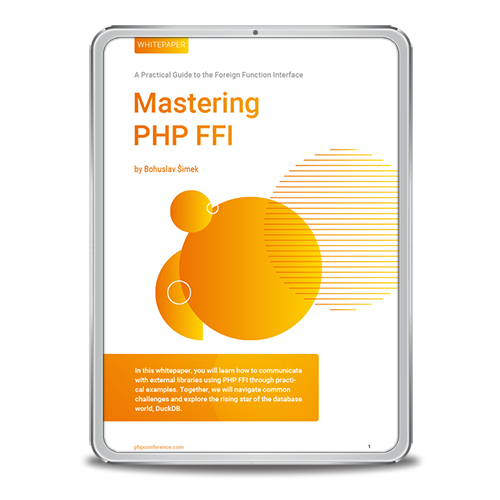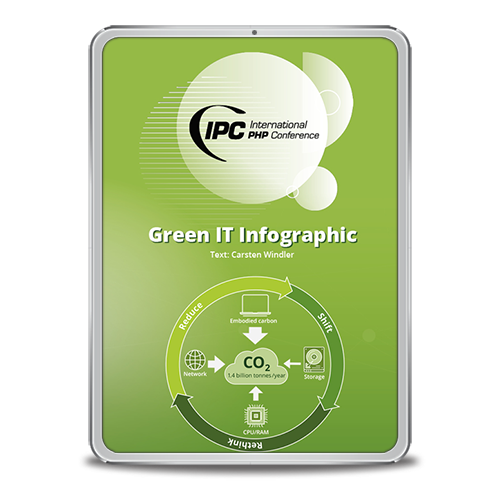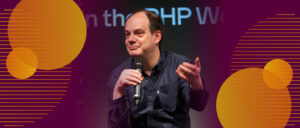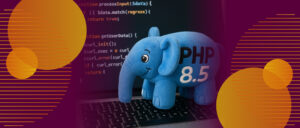In 1995, the PHP programming language was developed by Rasmus Lerdorf. This year, PHP celebrates its 25th birthday. We asked four PHP experts – Matthew Brown, Damien Seguy, Ralf Eggert and Marcel Normann – what role PHP still plays in their lives today. Above all, we wanted to know what they think the future holds for the programming language and what their wishes are for PHP 8.
The programming language PHP will be 25 years old this year. When did you first encounter PHP and what role does it play in your life today?
Matthew Brown: I migrated my personal site from Perl to PHP around mid-2003.
Today it’s the language that I write 99 percent of my code in. I know more about PHP (and its idiosyncrasies) than I do any other language.
Damien Seguy: I started working with PHP in 1999, during the transition from PHP 3 to PHP 4. At that time, I was starting a new company with free hosting, and it made sense to offer an advanced system with a programming language and a database: this helped distinguish us with the rest of the web hosts at that time.
This was at that time that I started contributing to the community, by translating the documentation into French, and participating in PHP conferences: my first one was IPC in Frankfurt, 2001.
Nowadays, I have moved on to providing expert services for PHP code quality. I concentrated those 20 years of experience with PHP into a static analysis tool called Exakat, which is helping both newcomers and advanced users to harness the power of the platform. It has been quite an extraordinary experience.
Ralf Eggert: It must have been around 1998, when a guy named Björn Schotte brought PHP to the attention of a mailing list. At that time, I started messing around with Perl, but it didn’t feel good – PHP felt good from the beginning. Since then I have implemented many projects with PHP and built up a small agency that now has six permanent employees. Additionally, I can now even develop Alexa skills with PHP.
Marcel Normann: I was one of the last to move careers into the dot-com bubble in the late 90s. In 2000, I wanted to finally be able to send forms by email without accessing an external CGI mailer. At that time, I used classic ASP and the very fresh PHP 4. I chose PHP because ASP was much more expensive with the hosters and I also thought it would be more effective to write echo 500 times a day instead of Response.Write.
In the meantime, I’m getting more involved with PHP on a strategic level. In the web area it is an important player, but is no longer the only one.
PHP 8.0 will be released in 2020. What’s on your personal wish list for the upcoming major version? What feature do you think is missing?
Matthew Brown: I want more types. I’d love to see something like the “list” type from Python, and an explicit dictionary/map type that didn’t have some of the gotchas that PHP’s native array type has.
Damien Seguy: PHP has been modernizing itself since PHP 7.0, so I’m very keen on seeing this trend going on. The current typehint system is the most advanced yet, and there are some expected future features. For example, generics and multiple types. They will complete the current support, and help projects structure their applications further.
PHP 8.0 will also upgrade the current AST, the internal building blocks of the language. Some cumbersome old features are removed, while cleaner structures are introduced. For example, booleans will get their own dedicated tokens instead of sharing a space with the other constants. This makes the language more consistent with each version, and it opens large fields of experimentation for static analysis. In turn, this leads to better reviews.
Finally, as applications are getting larger, I’d like to see more structures to organize large sets of classes, methods and interfaces. Currently, we have to rely on names and namespaces. Tools or frameworks that organize the code in components or layers are a good start as they partition an application into manageable source code. We would need tools to shape those components at the PHP level, and external tools to organize them and check that they work internally or as a system, before execution. This will help us push PHP application size to the next level.
Ralf Eggert: Above all, I am very excited about the announced further performance improvements and whether they really deliver what they promise. Performance optimizations are always welcome.
I’m definitely curious about everything that comes along with it!
Marcel Normann: Once the FFI and asynchronous workloads are on board, I won’t have anything to add to my list, it would be a decent leap in the right direction.
Beyond this release I still hope we won’t lose sight of framework-less PHP: Years of running small services without major breaking changes could also create new interest in the enterprise area. At this point I keep pointing out the success of Go: There is a desire for simplicity and “opinionated” languages. Most of the ingredients for this are already present in the PHP universe, you just have to merge them.
Highlights of IPC 2020 in Berlin
People often claim PHP’s time is up. What’s the outlook for PHP from your perspective?
Matthew Brown: As long as independent developers want to prototype ideas for websites, there’ll be a place for PHP. There are (in my opinion) better languages for that task, but I think PHP has a great open source package ecosystem which sways things in PHP’s favor a lot of the time.
I think the biggest risk to PHP is that the community that cares far more about overall usage numbers — “it’s used on 70 percent of the web!” — than the quality of PHP code being deployed to those websites, and the ways in which the language itself encourages poor quality code. It should be a priority for us all to make it easier to write good quality code, and harder to write the bad stuff.
Damien Seguy: Since last millennium, PHP has survived every fatal prediction. Today, when looking at professional ecosystems and grassroot communities, it is impressive to see the go-forward attitude of PHP. In fact, a part of the community tries to speed up the evolution of the language by bringing revolutionary syntax to PHP, such as the P++ project.
During the last years, there was a renewal of the community with a new generation of programmers and community animators. PHP has worked hard on fixing its own limitations, and with its immense user base, it is a long process. Even symbols like the elePHPant plushy is making a comeback, with multiple generations spawning in multiple countries. With such a strong will to work and keep evolving, PHP has at least a whole decade of feats in store to dazzle us with!
Ralf Eggert: I can count on one hand the many candidates who have stepped forward as PHP killers over the last 20 years.
But in the wide field of web development, PHP is still ahead of the game. In the statistics of W3Techs, the share for PHP is 79 percent. Candidates such as Ruby or Node.js have so far achieved hardly any significant relevance.
I think that PHP still has a bright and interesting future ahead of it.
Marcel Normann: Indeed, I have known this since PHP first came into existence. In the meantime, there are indeed valid arguments against PHP – but they are not as technical as they used to be. Nevertheless, I am cautiously optimistic about the future of PHP: We shouldn’t underestimate such a widely used language’s powers of renewal – and certainly not that of its tenacious community.
Thank you very much for the interview!
The questions were asked by Madeleine Domogalla, editor of PHP Magazin.
Our PHP Experts
 Matthew Brown works on the developer experience team at Vimeo. He’s worked at Vimeo for five years and has broken almost everything at one point or another. He builds tools, including Psalm, to protect codebases from people like him. He’s British, and once earned a living as a church singer.
Matthew Brown works on the developer experience team at Vimeo. He’s worked at Vimeo for five years and has broken almost everything at one point or another. He builds tools, including Psalm, to protect codebases from people like him. He’s British, and once earned a living as a church singer. Damien Seguy is CTO at Exakat Ltd., a company specialized in PHP code quality solutions for the industry. He leads the development of the exakat static analysis engine, that automatically audit code for version compatibility, security and dead code. Since last millennium, Damien has contributed to PHP as a documentation author, elephpant breeder, and conference UFO on all continents. He also enjoys machine learning, gremlin, 狮子头 and camembert.
Damien Seguy is CTO at Exakat Ltd., a company specialized in PHP code quality solutions for the industry. He leads the development of the exakat static analysis engine, that automatically audit code for version compatibility, security and dead code. Since last millennium, Damien has contributed to PHP as a documentation author, elephpant breeder, and conference UFO on all continents. He also enjoys machine learning, gremlin, 狮子头 and camembert. Ralf Eggert is managing director of Travello GmbH, author of several books about Zend Framework and was also named Alexa Champion by Amazon. Ralf supports and advises his customers in the development of digital language assistants and does not miss the opportunity to implement his ideas in further interactive skills.
Ralf Eggert is managing director of Travello GmbH, author of several books about Zend Framework and was also named Alexa Champion by Amazon. Ralf supports and advises his customers in the development of digital language assistants and does not miss the opportunity to implement his ideas in further interactive skills. Marcel Normann is head of software development at the WhereGroup in Bonn. The company offers software services in the GeoIT area for Large companies and public authorities. Marcel has been working as a developer since 1999, thereof over 15 years with PHP. He spends his free time away from computers with beekeeping, jogging and sporadic firefighting operations.
Marcel Normann is head of software development at the WhereGroup in Bonn. The company offers software services in the GeoIT area for Large companies and public authorities. Marcel has been working as a developer since 1999, thereof over 15 years with PHP. He spends his free time away from computers with beekeeping, jogging and sporadic firefighting operations.




